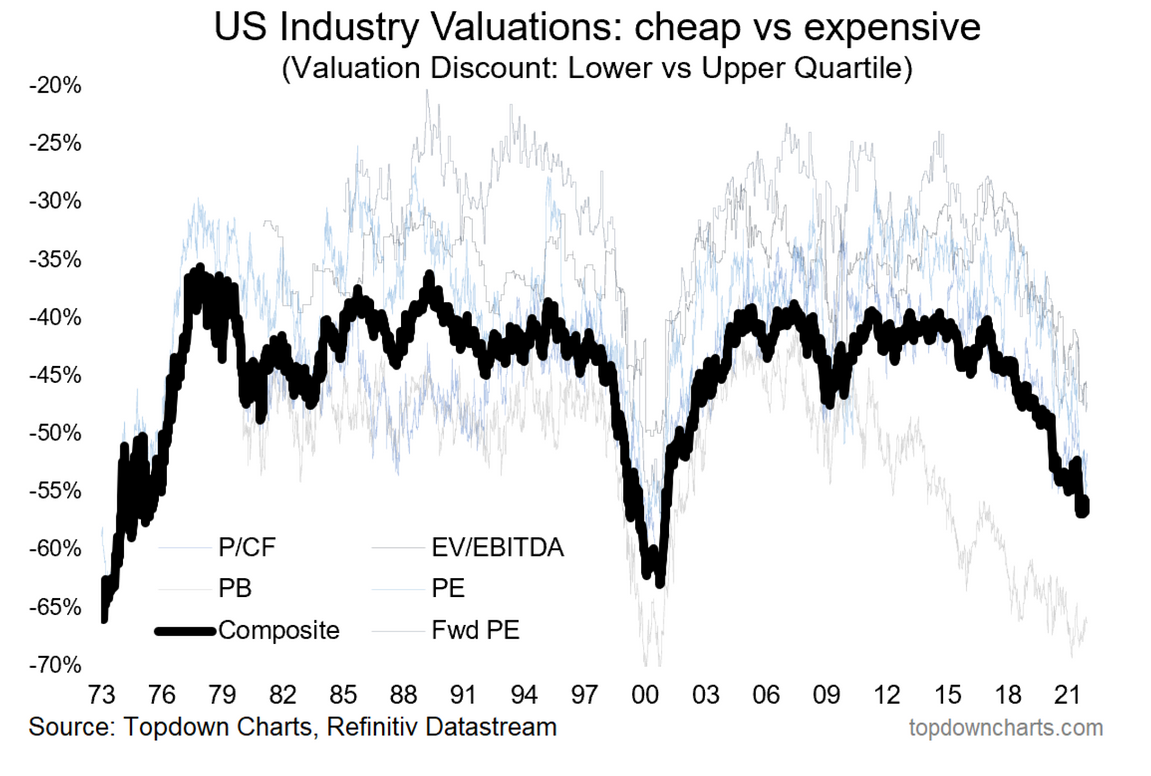Gold tops $4,500, Japan stabilizes, U.S. data in focus— what’s moving markets
This post was originally published at TopDown Charts
- Valuations have trended much more expensive this year and it’s harder to find pockets of absolute value
- Relative value can still be seen in three segments of global markets
- This week’s featured chart illustrates how the cheap have gotten cheaper versus the basket of most expensive industries
Year-end approaches, and it’s a natural time to reflect on just how far global markets have come. Another year of stellar gains for growth assets and property markets—due, in part, to massive fiscal stimulus and monetary easing in 2020—has made many asset classes richly valued. Finding attractively priced niches has become exceedingly difficult. Our Weekly Macro Themes report investigates the valuation situation among stocks, bonds, property, and commodities.
US vs. Ex-US Relative Valuation
From a relative value perspective, the US is extremely expensive versus the rest of the world. This is not breaking news to market participants, but our indicators show the trend has turned more extreme in recent months.
To put the valuation disconnect into context, the US PE10 ratio is just over double that of the median PE10 for ex-US markets. The breadth numbers are also something to behold: 95% of countries are at least 20% cheaper than the US on a PE10 basis. These valuation gaps seem to grow wider each week as the total US market outperforms foreign shares. Year-to-date, US stocks are up 23% while ex-US equities are up just 5% (total return). That’s the biggest annual spread in favor of US equities since 1997.
An Industry-Level Perspective
Readers are familiar with one way we like to look at relative value in the equity space: comparing cheap versus expensive industries in the US. Our featured chart illustrates that the last four years have been a period where growth has crushed value.
The valuation differential between the cheapest versus most expensive parts of the market is at a 20-year extreme. Only the dot-com bubble and early 1970s Nifty Fifty boom were more stretched.

Absolute Valuations Still Pricey
This week’s report also investigates the price-to-book value on the three industry areas broken out by valuation: the upper quartile, median, and lower quartile. It turns out that the most expensive quartile of industries is now pricier than it was at the dot-com bubble peak.
Even the most inexpensive 25% of industries is expensive relative to its history.
Cyclical Value and Defensive Value
We’ve also outlined “cyclical value” (energy and financials) versus “defensive value” (healthcare, consumer staples, utilities) before. These two buckets are cheap compared to the S&P 500. Energy and financials, despite strong returns over the last year, show better relative value today than during the dot-com bubble. Defensive value stocks are turning cheaper, too.
As the tech super-sector (including the IT sector with names like Amazon (NASDAQ:AMZN), Alphabet (NASDAQ:GOOGL), and Tesla (NASDAQ:TSLA)) grows its share of global market cap, it leaves the rest of the market and world with a generally cheaper look.
Global Small Caps versus Large Caps
One slice of the global market, small caps, continues to sport a discount versus global large caps. Our global small versus large valuation indicator shows that the smalls are about one standard deviation cheaper than global large caps after approaching breakeven earlier in 2021.
Bottom Line: Pandemic stimulus measures produced many unintended consequences; a key one being making about every asset class expensive. Even commodities are no longer cheap. Still, we can at least find relative value in global versus US, value versus growth, and small versus large equities.
